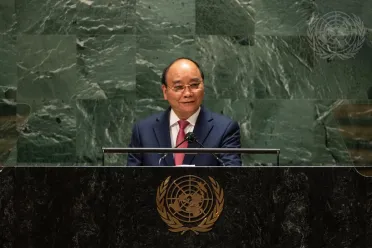Statement
Statement summary
NGUYEN XUAN PHUC, State President of Viet Nam, said that no statistics can truly measure the grief and loss caused by the pandemic, which has exposed the shortcomings of the global governance system and increased inequality among nations. COVID-19 is not, however, the only challenge that the world is facing today, he said, pointing to growing tensions among major Powers, the rise of power politics, disregard for international law and unilateral acts of coercion. In this context, international solidarity and multilateralism are important, with the United Nations coordinating efforts to respond to challenges that no one country can resolve on its own, he said.
Containing the spread of COVID-19 is the most urgent task, he said, emphasizing that “the world cannot be safe if any single person or country still suffers from this pandemic”. Priority in the allocation of vaccines should go to those nations with a low vaccination rate and developing countries should have the ability to produce vaccines. Resilience can only be sustainable if it is built upon cooperation and connectivity among nations. Hopefully, Member States will keep working with the United Nations system in that regard, he noted.
Challenges must be turned into development opportunities, he continued, underscoring the promise of digitalization, new technologies and enhanced productivity, competitiveness and economic self-reliance. Describing the 2030 Agenda as an excellent road map, he called on all countries to fulfil their development financing obligations, reschedule debt payments for developing countries and give those countries the resources they need to overcome the pandemic.
Turning to the climate crisis, he said that developed countries should take the lead in cutting greenhouse gas emissions, while developing countries should get more financial and technological help to reduce their emissions, strengthen disaster prevention and transition towards a green economy. All countries must strive towards a global ceasefire and a halt to all violence, while also ensuring the safety of civilians and facilitating humanitarian assistance in conflict zones. He called for an end to the unilateral and illegal embargo against Cuba, expressed solidarity with Palestinians and support for a two-State solution in the Middle East, and hoped that the situation in Afghanistan will stabilize soon.
After 30 years of Đổi Mới, or economic reforms, Viet Nam is on track to become a high-income developed country by 2045, the centenary of its independence, he said. Its people-centred approach is closely aligned with the Sustainable Development Goals, with the fruits of its reforms due in part to efforts by the United Nations development system. Viet Nam is working closely with other ASEAN members to maintain peace, security and prosperity in the region, including by implementing ASEAN’s five-point consensus on Myanmar. In the South China Sea, all parties should refrain from actions that might further complicate the situation. Disputes should be resolved peacefully, in line with the United Nations Charter, the 1982 United Nations Convention on the Law of the Sea and the Declaration on the Conduct of Parties in the South China Sea, he said.
Full statement
Read the full statement, in PDF format.
Photo

Previous sessions
Access the statements from previous sessions.
